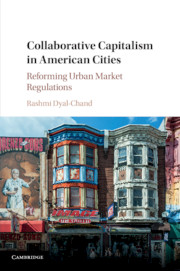Book contents
- Collaborative Capitalism in American Cities
- Collaborative Capitalism in American Cities
- Copyright page
- Dedication
- Contents
- Acknowledgments
- 1 Introduction
- Part I Collaborative Capitalism Defined
- Part II Collaborative Capitalism Explored
- 4 Rehabilitating South Shore
- 5 Regulating against Sharing
- 6 More Than a Day’s Work in Austin
- 7 Understanding Collaborative Capitalism
- Part III Collaborative Capitalism Reinvigorated
- Appendix
- Index
5 - Regulating against Sharing
from Part II - Collaborative Capitalism Explored
Published online by Cambridge University Press: 26 April 2018
- Collaborative Capitalism in American Cities
- Collaborative Capitalism in American Cities
- Copyright page
- Dedication
- Contents
- Acknowledgments
- 1 Introduction
- Part I Collaborative Capitalism Defined
- Part II Collaborative Capitalism Explored
- 4 Rehabilitating South Shore
- 5 Regulating against Sharing
- 6 More Than a Day’s Work in Austin
- 7 Understanding Collaborative Capitalism
- Part III Collaborative Capitalism Reinvigorated
- Appendix
- Index
Summary
- Type
- Chapter
- Information
- Collaborative Capitalism in American CitiesReforming Urban Market Regulations, pp. 118 - 131Publisher: Cambridge University PressPrint publication year: 2018



